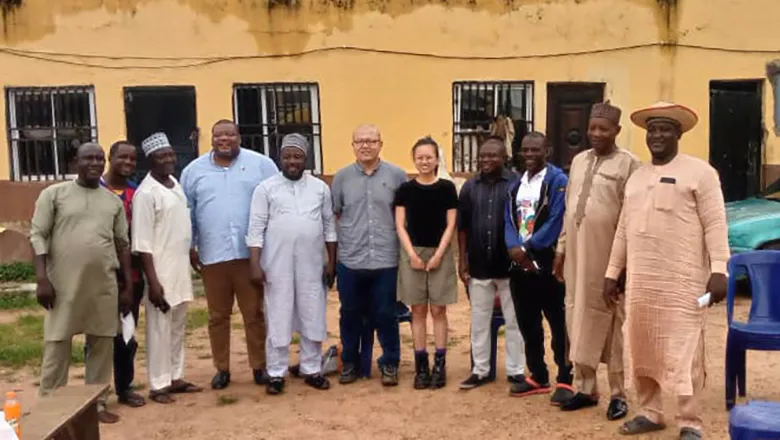We’re developing new technology solutions that can be used throughout the food supply chain...This means we can store excess cooling energy when demand for electricity is low and release it when it is high."
Hange Lao
04 September 2023
King's engineers decarbonise the food chain in Nigeria
Researchers worked with local partners in Abuja to inform how their research could help keep food fresh using solar power

Researchers from the Department of Engineering embarked on a fact-finding mission to local food markets in Abuja, Nigeria, to ascertain the challenges faced when keeping perishables refrigerated using solar power, as part of a project to develop greener and cheaper technology for food storage.
Experts in solar energy, Dr Wei He, Senior Lecturer in Engineering, and PhD student Hange Lao went earlier this month as part of an InnovateUK’s programme to develop sustainable and resilient food supply chains in the developing world, alongside Nigerian cold storage provider and industry partner ColdHubs.
During the visit, Dr He and Lao conducted interviews and stakeholder engagement activities with market traders to analyse the organisational structures of different markets in the food ecosystem, as well as the pain points local traders face when keeping their food refrigerated. By doing so, the team was able to better understand how their research on solar energy, energy storage and food cold train technology could be applied to make effective food storage easier and cheaper in the real world.
The insights gathered will feed into an existing project to decarbonise the food chain, which is being carried out in collaboration with the University of Oxford.
Hange Lao explains: “Traditional refrigeration units are restricted by their reliance on a steady electricity supply, which is expensive and in areas with limited energy infrastructure, not always available. Solar powered alternatives are a step in the right direction, but they still rely on expensive battery technology to power the unit at times when solar panels are not generating energy, like at night.
“With our partners at Oxford, we’re developing new technology solutions that can be used throughout the food supply chain. We are developing units lined with a phase change material, a material that releases or absorbs energy when it changes phase, like ice into water. This means we can store excess cooling energy when demand for electricity is low and release it when it is high.
“We can thus avoid having to use batteries continuously and avoid paying for fuel when demand for power is low. This technology enables us to reduce food loss from improper storage, ensure that refrigeration isn’t reliant on fossil fuels and unstable energy infrastructure, and offer a cheaper alternative to food producers, benefiting all those involved in food production.”
By designing a range of phase change materials and solar-powered refrigeration systems optimised for specific temperatures and certain food groups, the researchers hope to cater for food found in markets across the world, including meat, fish, vegetables and fruit.
The UK has a stable energy infrastructure, but we still need to urgently decarbonise our food sector, and the research fundamentals that our work has brought us can help us do that."
Dr Wei He, Senior Lecturer in Engineering
While it is hoped that this project will provide a solid foundation on which to further explore the food supply chains in Nigeria, Dr He hopes the research may provide a blueprint for sustainability efforts closer to home:
“This project has until now primarily been concerned with Nigeria and the challenges of its food supply chains, whether that be its rapidly growing population or the specifics of its geography and market structures. However, this provides a strong foundation for how we might alter our approach for different cultures and markets across the globe – including our own.
“The UK has a stable energy infrastructure, but we still need to urgently decarbonise our food sector, and the research fundamentals that our work has brought us can help us do that. We can now begin to think about how the lessons learned abroad might be applied closer here in the West.”

